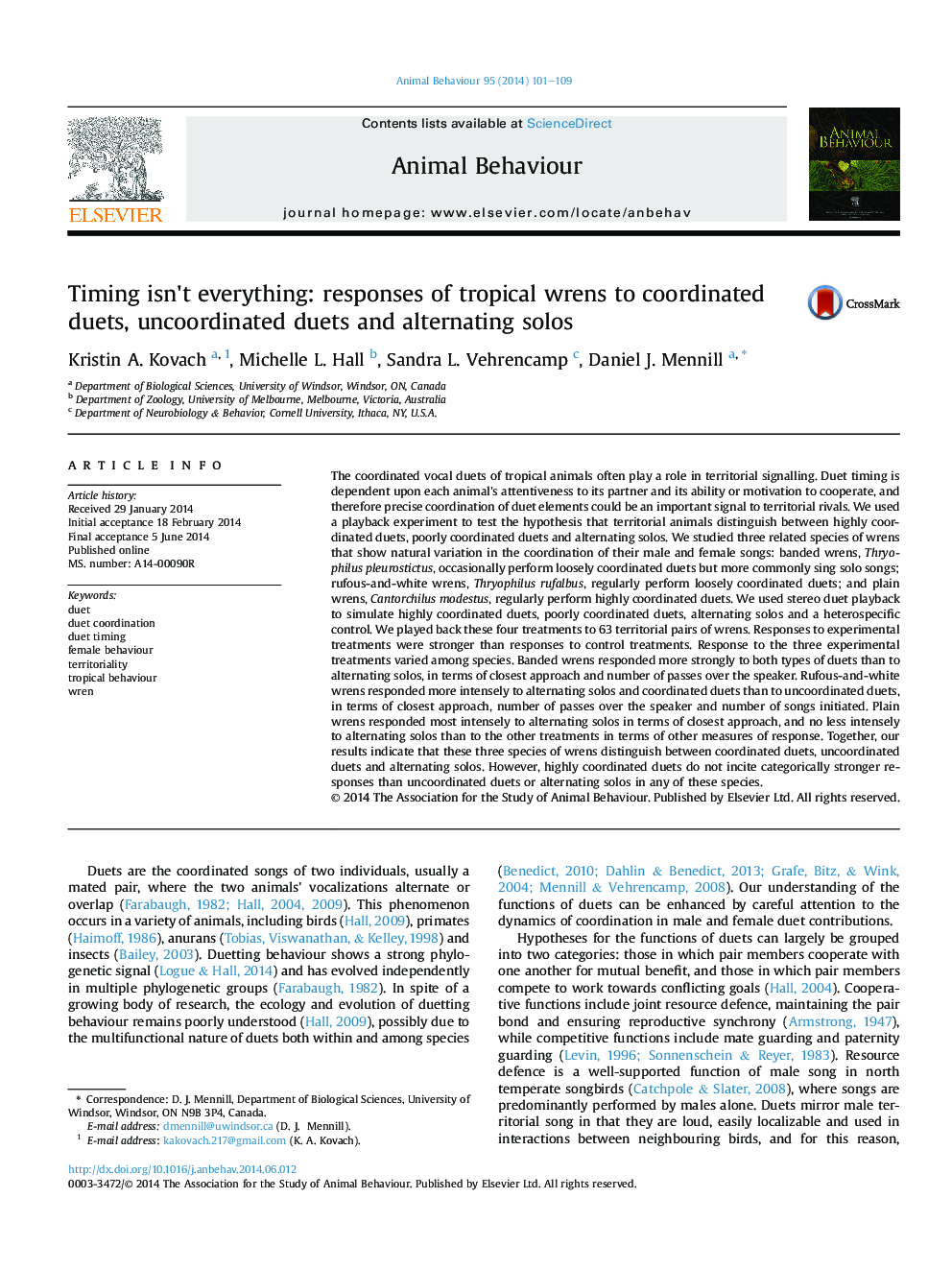| کد مقاله | کد نشریه | سال انتشار | مقاله انگلیسی | نسخه تمام متن |
|---|---|---|---|---|
| 8490379 | 1552233 | 2014 | 9 صفحه PDF | دانلود رایگان |
عنوان انگلیسی مقاله ISI
Timing isn't everything: responses of tropical wrens to coordinated duets, uncoordinated duets and alternating solos
ترجمه فارسی عنوان
زمان بندی همه چیز نیست: پاسخ گنبدهای استوایی به دوئت های هماهنگ، دوئت های غیر هماهنگ و متناوب
دانلود مقاله + سفارش ترجمه
دانلود مقاله ISI انگلیسی
رایگان برای ایرانیان
کلمات کلیدی
موضوعات مرتبط
علوم زیستی و بیوفناوری
علوم کشاورزی و بیولوژیک
علوم دامی و جانورشناسی
چکیده انگلیسی
The coordinated vocal duets of tropical animals often play a role in territorial signalling. Duet timing is dependent upon each animal's attentiveness to its partner and its ability or motivation to cooperate, and therefore precise coordination of duet elements could be an important signal to territorial rivals. We used a playback experiment to test the hypothesis that territorial animals distinguish between highly coordinated duets, poorly coordinated duets and alternating solos. We studied three related species of wrens that show natural variation in the coordination of their male and female songs: banded wrens, Thryophilus pleurostictus, occasionally perform loosely coordinated duets but more commonly sing solo songs; rufous-and-white wrens, Thryophilus rufalbus, regularly perform loosely coordinated duets; and plain wrens, Cantorchilus modestus, regularly perform highly coordinated duets. We used stereo duet playback to simulate highly coordinated duets, poorly coordinated duets, alternating solos and a heterospecific control. We played back these four treatments to 63 territorial pairs of wrens. Responses to experimental treatments were stronger than responses to control treatments. Response to the three experimental treatments varied among species. Banded wrens responded more strongly to both types of duets than to alternating solos, in terms of closest approach and number of passes over the speaker. Rufous-and-white wrens responded more intensely to alternating solos and coordinated duets than to uncoordinated duets, in terms of closest approach, number of passes over the speaker and number of songs initiated. Plain wrens responded most intensely to alternating solos in terms of closest approach, and no less intensely to alternating solos than to the other treatments in terms of other measures of response. Together, our results indicate that these three species of wrens distinguish between coordinated duets, uncoordinated duets and alternating solos. However, highly coordinated duets do not incite categorically stronger responses than uncoordinated duets or alternating solos in any of these species.
ناشر
Database: Elsevier - ScienceDirect (ساینس دایرکت)
Journal: Animal Behaviour - Volume 95, September 2014, Pages 101-109
Journal: Animal Behaviour - Volume 95, September 2014, Pages 101-109
نویسندگان
Kristin A. Kovach, Michelle L. Hall, Sandra L. Vehrencamp, Daniel J. Mennill,
